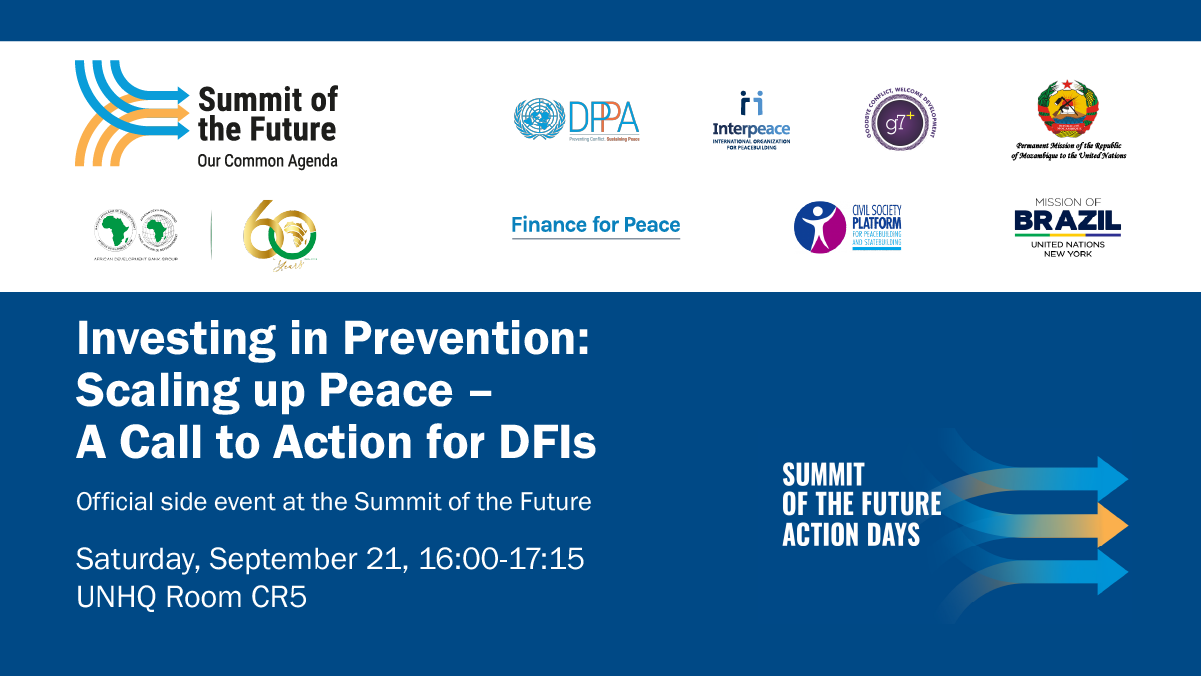
Introduction
The Secretary-General's New Agenda for Peace urges International Financial Institutions (IFIs) to become agents for peace. The African Development Bank is moving in that direction. The Bank’s new Ten-year strategy (2024-2033) emphasizes peace and security as public goods. In the context of the Bank’s Mid-Term Review of its Strategy to Address Fragility and Build Resilience (2022-2026), this note proposes a high-level panel discussion to mobilize DFIs and highlight the need for scaling up peace through peace-positive investments. This joint side event is proposed by a multi-stakeholder coalition including AFDB, the Government of Mozambique, the g7+, UNPBSO, Interpeace, and the Civil Society Platform for Peacebuilding and Statebuilding (CSPPS).
Objectifs
- To mobilize Development Finance Institutions (DFIs) to prioritize and scale up investments that contribute to peacebuilding, resilience, and stability in fragile and conflict-affected areas.
- To showcase innovative partnerships and financing mechanisms that integrate peacebuilding and development, with a specific focus on leveraging public and private resources for sustainable peace-positive investments.
Context and Rationale
- The world is grappling with a poly-crisis marked by escalating geopolitical tensions, , environmental challenges, food insecurity, a breakdown of multilateral cooperation, and shrinking civic space. Over the last 20 years, the level of conflict has escalated, with 11 of the most conflict-affected states located in Africa. Roughly one-fifth of Africa's population resides in conflict affected areas, which also constitute home to half of the continent's population living in extreme poverty. Many of these conflicts are primarily regional, leading to illicit markets, youth radicalization, and population displacement that spans across borders. The number of refugees and internally displaced persons has also steadily risen, now exceeding over 40 million in early 2024, more than twice from a decade ago. African countries facing high-intensity conflict have an average annual economic growth rate 2.5 percentage points lower than their counterparts, with long-term negative consequences.
- Despite contributing only 2-3% of global emissions, Africa bears a disproportionate exposure to environmental risks. African countries most susceptible to environmental impact have historically received minimal climate finance, receiving just $2.1 per capita in adaptation financing. In regions like the Sahel, the Great Lakes, and the Horn of Africa, challenges continue to persist and intensify, with environmental pressures adding to the complexity of the situation.
- Given this context, it is essential for leaders and communities to invest in long-term peacebuilding and resilience-building solutions, engaging local communities to build sustainable and resilient interventions to pursue sustainable and inclusive development. The UN General Assembly’s Resolution on Financing for Peacebuilding (A/RES/76/305) encourages innovative financing mechanisms to support peacebuilding, while resolutions A/RES/75/201 and S/RES/2558 call for a comprehensive review of the UN Peacebuilding Architecture in 2025.
- The African Development Bank’s strategy (2022-2026) to address fragility and build resilience prioritizes prevention over crisis response. based firmly on the principle that preventing crises is far preferable to responding after they occur. However, it remains chronically underprioritized by global actors. The UN Secretary General has emphasized that for the New Agenda for Peace to succeed, member states must go beyond lip service and invest politically and financially, in prevention emphasizing that effective prevention requires comprehensive approaches, political courage, effective partnerships, sustainable resources, and national ownership.
- DFIs must champion the deliberate efforts to mobilize and deploy development finance with explicit peace objectives. The AfDB has launched a comprehensive assessment of its portfolio to establish alignment with peace-positive investment standards1, and to use the findings to inform future programming. The Bank is also working with the African Union and Regional Economic Communities to structure a Security Indexed Investment Bond that will scale up resource mobilization and investments at the nexus of development, peace and security.
- The AfDB signed a Memorandum of Understanding (MoU) with Interpeace, an international peacebuilding organization, in October 2023, to advance peace-responsive investments approaches in some of the world's most conflict-affected places. The Bank and Interpeace recognize the intrinsic relationship between finance and peace, and the mutual benefits of working together towards the realization of a market for peace in Africa and beyond. Through this innovative partnership with a peacebuilding actor, the AfDB has affirmed its commitment to embed peace responsiveness in the Bank’s strategies and processes, and to develop the market intelligence needed to build the local networks and capacities to catalyze private and public capital for inclusive, equitable and peace-positive investments.
Format of the Side Event
- The high-level panel will focus on how to put the new agenda for peace into action, how can IFIs become agents for peace and the role for multi-stakeholder partnerships to effectively invest in prevention and scaling-up peace through peace-positive investments. The Government of Mozambique will leverage the platform to present and mobilize support for the Peace and Security Investment Hub, a joint program to be piloted in Northern Mozambique that seeks to mobilize the resources needed to accelerate national development plans as well as to provide accompaniment and technical support to ensure that the Government’s needs and priorities in stability and sustainability are addressed by prospected investments. The example of the Hub will be presented as a vehicle to implement a new approach that offers an inspiration for other countries, including members of the g7+.
- Subsequently, practitioners from the World Economic Forum, Civil Society Platform for Peacebuilding and Statebuilding (CSPPS), United Nations Capital Development Fund, Asian Development Bank and Norfund will offer case studies and examples to reinforce that scaling up is indeed possible.
Featured speakers will include:
Marie Laure Akin-Olugbade – Vice President RDVP, African Development Bank (Moderator)
Adriano Maleiane Prime Minister and Minister of Economy and Finance, Government of Mozambique
Kenyeh Barlay, Minister of Planning and Economic Development of Sierra Leone and Chair of g7+
Issa Faye, Director General, Islamic Development Bank
Elizabeth Spehar, Assistant Secretary General, UNPBSO
Itonde Kakoma, President, Interpeace
Peter Van Sluijs, Expert Peacebuilding and Conflict Prevention and Coordinator, Civil Society Platform for Peacebuilding and Statebuilding (CSPPS)
